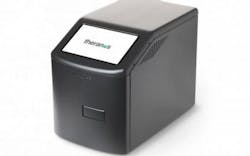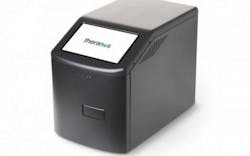Reliving biotech’s most shocking scandal — the story of Theranos
If you haven’t fallen down an internet rabbit hole reading about Theranos — a name that has become synonymous with the biggest scandal in biotech history — now’s a really great time. Recently, HBO premiered a new documentary about the precipitous rise of Elizabeth Holmes, the company’s founder and CEO, and her eventual plunge from grace.
A Theranos testing device
Called “The Inventor: Out for Blood in Silicon Valley,” the documentary details how Holmes and other executives at Theranos set out to create a revolutionary blood-testing device that ultimately didn’t work. Holmes, an entrepreneurial wiz-kid who dropped out of Stanford at 19 to start the company, had a truly game-changing idea. Because of her fear of needles and her interest in biotech, Holmes wanted to design a device that could perform hundreds of tests from a single drop of blood (drawn from a nearly painless pin prick) on a mobile device that would feed results to users quicker than standard lab work.
During the company's early years (in the mid-2000s), Holmes and Theranos looked to partner with pharma companies they thought could use the technology to detect side effects during drug trials. In fact, reports from that time suggested that Theranos was partially funded by partnership deals to develop the tech for clinical trials with GlaxoSmithKline and Pfizer. But both companies later denied those reports, indicating that Theranos could have allowed false reports to go public in order to bolster the company’s appearance.
According to “Bad Blood: Secrets and Lies in a Silicon Valley Startup,” a book written by John Carreyrou, the Wall Street Journal reporter who was instrumental in bringing the company’s fraud to light, Theranos execs also flew to Switzerland in 2006 to demo the tech to leaders at Novartis. During the meeting, Holmes claimed that Theranos had struck over a dozen deals with Big Pharma companies who wanted to use their tech for patient monitoring.
There was an issue though — It was mostly all a lie.
Not only did the Theranos devices malfunction — which led to the company to secretly perform the blood tests in a lab using traditional methods — but Theranos never made a big deal with a pharma company. In reality, the pharma companies that met with Theranos seemed to wisely sense that Holmes couldn’t deliver what she was promising.
Undeterred, Theranos ultimately struck massive deals with major healthcare retailers such as Walgreens and Safeway, who wanted to put the devices in stores across the country. Eventually, the company would grow to employ hundreds and reach a value of $9 billion. But in 2015, Carreyrou began publishing his reports that the Theranos devices didn’t work and that Holmes and other execs had defrauded investors.
The house of cards eventually tumbled at Theranos and last year, the SEC charged Holmes with “massive fraud,” which she settled for $500,000. Holmes and another former exec from Theranos are now also facing multiple counts of fraud in a U.S. District Court in San Jose, where, if convicted, Holmes faces up to 20 years in prison. The company officially closed its office in the summer of 2018.
On the big screen, however, the saga is set to continue. In addition to the HBO documentary, a feature movie is supposedly in the works that will star Jennifer Lawrence as Elizabeth Holmes. There have also been reports of an upcoming Hulu series starring Kate McKinnon.
As one of the most shocking cases of fraud in biotech and U.S. history, it’s worth diving into the story of Theranos to better understand how easily investors, the media and even regulators can be fooled by flashy startups in healthcare.
Learn more about the HBO documentary, “The Inventor.”
Learn more about the book, “Bad Blood,” which won several notable awards in 2018, including “Best Nonfiction Audiobook of the Year” by Audible.

